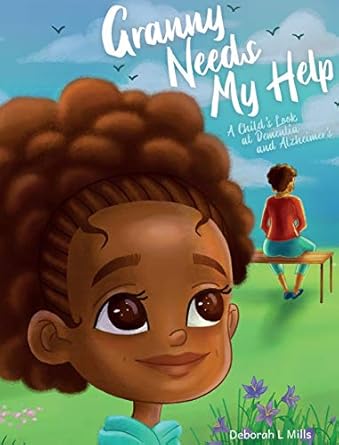
Granny Needs My Help: A Child’s Look at Dementia and Alzheimer’s
Are you looking for a picture book to talk about dementia or Alzheimer’s with a child? This Alzheimer’s book for children explains Alzheimer’s dementia in kid-friendly terms. The book presents memory loss in an easy-to-understand narrative.
Boys and girls alike will benefit from this “must have” children’s read. Alzheimer’s has an impact on families around the world. This book allows a family to face this challenge together and make the most of every available moment.
In Granny Needs My Help: A Child’s Look at Dementia and Alzheimer’s the main character Zéh is excited, happy, and challenged as she helps and continues to show her granny expressed love. She gains an understanding of dementia, as she has fun with and is challenged by her granny. Granny Needs My Help is a true gem for families and children of all ages.
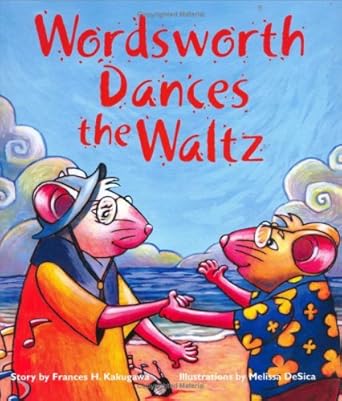
Wordsworth Dances the Waltz (Wordsworth the Poet Book 2)
Wordsworth, the little Hawaiian mouse who loves poetry, doesn’t understand why there is so much whispering around the house since Grandma came to live with his family. He remembers her last visit, when the house was filled with laughter, and he and Grandma danced around the room together. But now, Wordsworth and his siblings have to walk softly and be quiet so they don’t disturb Grandma. In “Wordsworth Dances the Waltz,” children are introduced to the concept that as grandparents age, they may become different, and even forget important things. Wordsworth finds comfort in writing poems that express his confusion over the changes in his beloved grandparent and the fond memories he has of her more vibrant days. He wonders, “Now that shes losing her memory/She’s still my Grandma, isnt she?” The answer, of course, is yes — nothing could ever change that. Wordsworth’s poems help his family understand that Grandma would still like to do things she always loved — spending time with the family, laughing and dancing.
“Wordsworth Dances the Waltz” is dedicated to author Frances Kakugawa’s late mother, Matsue, who was afflicted with Alzheimer’s disease. Frances was her primary caregiver for five years; during that time she found that poetry and journaling helped to ease the rigorous burden of caregiving.
“Wordsworth Dances the Waltz” received the Bronze Award in the Best Book Overall category and the award for Best Illustrated Children’s Book from the Northern California Publishers & Authors (NCPA) group for books published in 2007. “Wordsworth” is also a Mom’s Choice Award Silver Recipient.
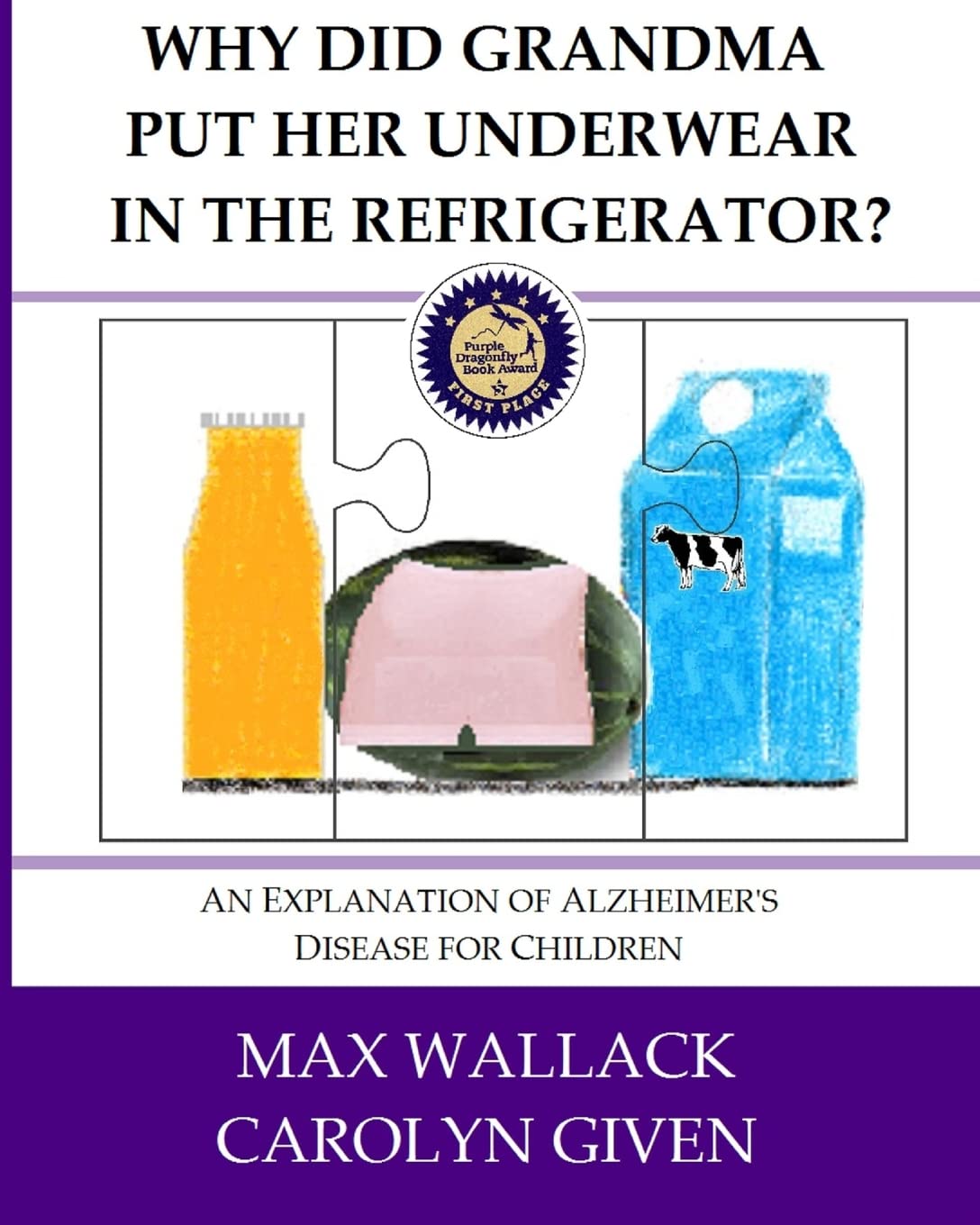
Why Did Grandma Put Her Underwear in the Refrigerator?
On some days, seven-year old Julie feels like she’s living in a Fun House. Hers is a topsy-turvy world where the toaster sprouts a toothbrush, and a watermelon gets dressed up in pink underpants for Fourth of July! But on other days, Julie struggles with understanding why her Halloween trick-or-treating got cancelled, or why Grandma can’t remember her name. Julie is struggling with understanding her grandmother’s Alzheimer’s disease. Authors Max Wallack and Carolyn Given believe that no child is too young to learn about this disease, or how to participate in providing safe care for their loved one. Why Did Grandma Put Her Underwear in the Refrigerator? is a sensitive, light-hearted children’s story that seamlessly provides its young readers with a toolbox to help them overcome their fears and frustrations. It shares easy-to-understand explanations of what happens inside the brains of Alzheimer’s patients, how to cope with gradual memory loss, with a missed holiday, or even a missing Grandma! This 40-page fully illustrated children’s book is told from a second-grader’s perspective in her own style and vocabulary, but it lovingly shares real strategies, scientific insights and lessons of dignity from which adult caregivers may also benefit.
Max Wallack has received numerous national awards for his work on behalf of Alzheimer’s patients. These include the Nestle Very Best in Youth Award, the Citizen’s Bank Trufit Good Citizen Scholarship, the Diller Teen Tikkun Olam Award, the Jefferson Award for Public Service, the Daughters of the American Revolution Community Service Award, and the President’s Call to Service Medal. He has published in respected journals in the field of Alzheimer’s research and has presented his work at national and international conferences. Carolyn Given is an acclaimed middle and high school educator, an experienced caregiver herself, and recipient of an award from the Soul-Making Keats Literary Competition sponsored by the National League of American Pen Women. Together, Max and Carolyn have created a book that is a necessity for the millions of children and grandchildren who are currently dealing with this incurable disease.
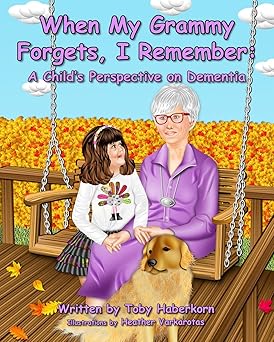
When My Grammy Forgets, I Remember: A Child’s Perspective on Dementia
When My Grammy Forgets, I Remember: A Child’s Perspective on Dementia provides conversational openings and stimulates discussion between parents and children about compassion and this debilitating disease.
Alzheimer’s and other dementia conditions not only affect the person suffering from the disease, but the entire family, especially the children.
This story explores the difficult reality of dementia and the bittersweet changing relationship between a granddaughter and her grandmother.
By including children in the family discussion, parents help them become resilient and empower them to provide comfort for the grandparent or loved one with Alzheimer’s.
The national Alzheimer’s Association and National Institutes of Health (NIH) have included this book on their children’s resource book lists.
Read less
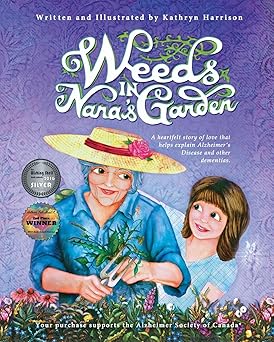
Weeds in Nana’s Garden: A heartfelt story of love that helps explain Alzheimer’s Disease and other dementias
A young girl and her Nana hold a special bond that blooms in the surroundings of Nana’s magical garden.Then one day, the girl finds many weeds in the garden. She soon discovers that her beloved Nana has Alzheimer’s Disease; an illness that affects an adult brain with tangles that get in the way of thoughts, kind of like how weeds get in the way of flowers.As time passes, the weeds grow thicker and her Nana declines, but the girl accepts the difficult changes with love, learning to take-over as the garden’s caregiver.Extending from the experience of caring for her mother, artist Kathryn Harrison has created this poignant children’s story with rich illustrations to candidly explore dementia diseases, while demonstrating the power of love. It is a journey that will cultivate understanding and touch your heart.After the story, a useful Question and Answer section is included.$1 from the purchase of this book will be donated to the Alzheimer Society of Canada. The Alzheimer Society is Canada’s leading health charity for people living with Alzheimer’s disease and other dementias.
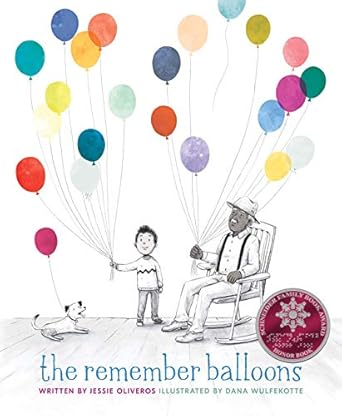
The Remember Balloons
A 2019 Schneider Family Award Honor Book!
What’s Happening to Grandpa meets Up in this tender, sensitive picture book that gently explains the memory loss associated with aging and diseases such as Alzheimer’s.
James’s Grandpa has the best balloons because he has the best memories. He has balloons showing Dad when he was young and Grandma when they were married. Grandpa has balloons about camping and Aunt Nelle’s poor cow. Grandpa also has a silver balloon filled with the memory of a fishing trip he and James took together.
But when Grandpa’s balloons begin to float away, James is heartbroken. No matter how hard he runs, James can’t catch them. One day, Grandpa lets go of the silver balloon—and he doesn’t even notice!
Grandpa no longer has balloons of his own. But James has many more than before. It’s up to him to share those balloons, one by one.
Watch Read Aloud Video on Youtube
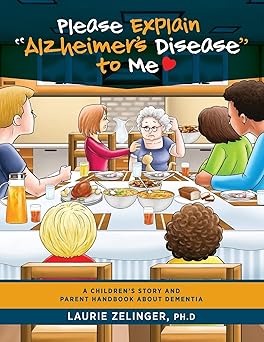
Please Explain Alzheimer’s Disease to Me: A Children’s Story and Parent Handbook About Dementia (“Please Explain to Me”)
Please Explain Alzheimer’s Disease to Me introduces the condition to children in a colorful, sensitive and gentle story, followed by a parent/caregiver section that supplies comprehensive information that adults can use to understand and plan for the course of the disease affecting their loved one. Dr. Zelinger, a board-certified psychologist for children, presents the situation to children in a warm, developmentally appropriate way using appealing characters of diversity, child friendly language and familiar scenes they can relate to, as well as scripts that parents can use when speaking to their child. This book is more than a helpful guide-it’s the only book you will need if you have a child who is asking, “What’s wrong with grandpa?”
Children will:
Enjoy the story and illustrations and will identify with the main characters
Get answers to their questions
Grasp the nature and reason for a grandparent’s changes
Learn basic biological information about brain function
Understand why a grandparent will require more care
Feel empowered and find ways they can be helpful
Parents and caregivers will:
Have word-for-word scripts available to answer their child’s questions
Learn about the progression of the disease
Understand their role and the nature of care that is required
Gain information for decision-making in areas of medical, emotional and daily care
Know they are not alone in this difficult journey
“Dr. Zelinger has provided an engaging book that presents important information in a user-friendly format and offers adults the foundation for easily engaging children in what may initially seem like a very difficult discussion. I will be sure to recommend this resource to everyone I know in the ‘sandwich generation.'” — Shane S. Bush, Ph.D., ABPP, Board Certified in Geropsychology, President, American Board of Geropsychology
“Dr. Zelinger’s book helps take the mystery out of a truly mystifying disease. The children’s story will help reduce the anxiety and fear a child may have when faced with one suffering from Alzheimer’s, and the adult portion of this book gives practical examples to help guide the adult when questions arise. A truly informative and inspired book.” — Marilyn Cherney, occupational therapist; grandmother
“Dr. Zelinger takes a painful topic for both children and parents alike and turns it into a beautiful story and a detailed handbook that gives us the tools we need to broach a topic we all hope to never have to face. This book is a must-read for families facing the challenges that come along with a loved one experiencing Alzheimer’s disease.” — Avi Satt, president, Allegria Senior Living
“A very much-needed book to explain a difficult topic to our children and ourselves. Dr. Zelinger’s warmth, insight and clinical judgment shine through her every page! This is a superlative book that will get front row billing on my office bookshelf.” — Deborah Lief-Dienstag MD, FAAP, pediatrician
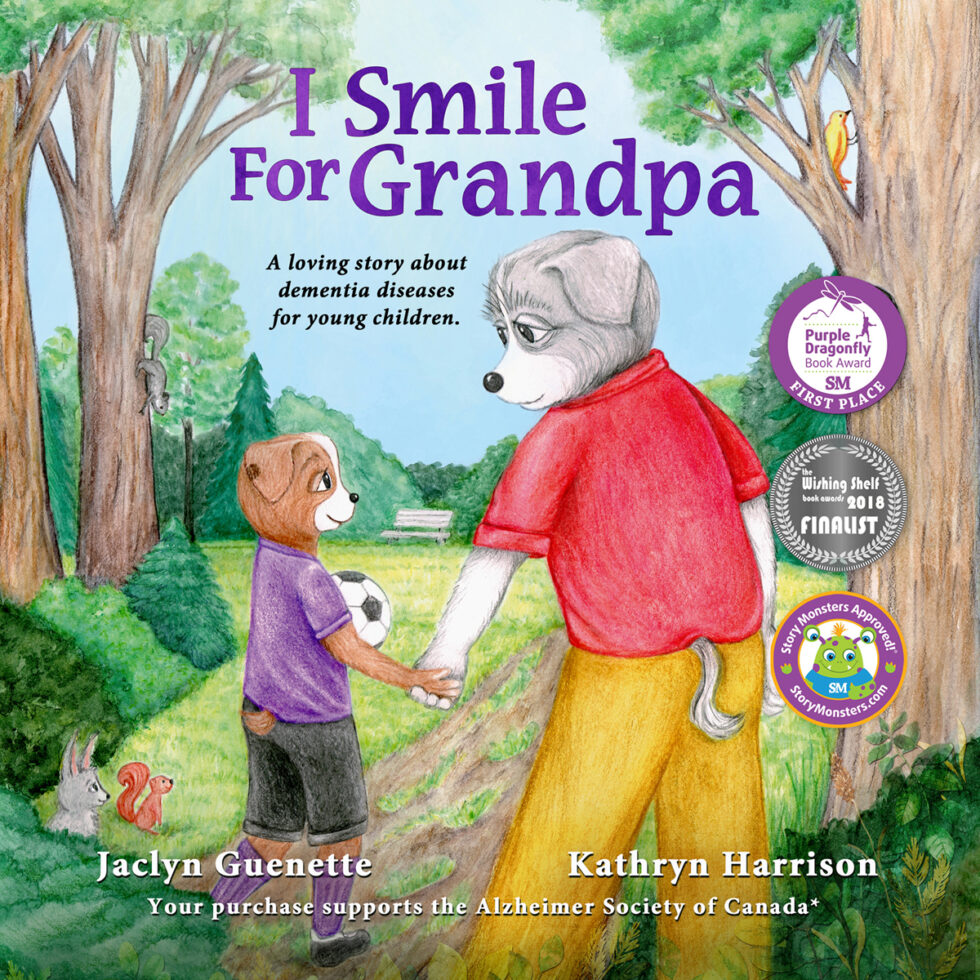
I Smile For Grandpa: A loving story about dementia disease for young children
Discover the heartwarming relationship between Grandpa and his Little Buddy in this touching book. When Grandpa is diagnosed with a dementia disease, Little Buddy realizes playing soccer together won’t quite be the same. But, while the activities that Grandpa can do are changing, there is still much fun to be had. In fact, spending time with each other is as special as ever!
Using delightful and tender illustrations, dementia is compassionately explored through the innocent eyes of a child to create a greater understanding of the disease. Tips for speaking with your child as well as a useful Q&A are also included to enhance learning.
Written by Registered Social Worker and Dementia Care Expert, Jaclyn Guenette / Edited and Illustrated by Award-winning Author & Illustrator, Kathryn Harrison.
*A portion of profits from this book will be donated to the Alzheimer Society of Canada. The Alzheimer Society is Canada’s leading health charity for people living with Alzheimer’s Disease and other dementias. Thank you for making a difference.

Ice Cream with Grandpa: A Loving Story for Kids About Alzheimer’s & Dementia
After his beloved grandpa’s health declines and he receives a diagnosis of dementia, a grandson must navigate the changes in their relationship. Through it all, he learns that Grandpa is still Grandpa, and their bond deepens and sweetens through a shared love of ice cream.
Ice Cream with Grandpa is a loving, tender picture book that gently explores the topics of dementia, aging, and loss. Written from a child’s point of view, it chronicles the changes in their relationship as his grandpa moves to assisted living, then memory care, and eventually hospice.
Based on the author’s own experience with her father and son, the engaging story and beautiful illustrations by Elisabete B. P. de Moraes addresses these challenging topics with a kind, age-appropriate approach that will resonate with young readers—while providing tools to help children maintain meaningful relationships with loved ones with the disease.
Includes a guide for parents on talking to kids about dementia, hospice, death, and grief written by expert on grief and loss, Diane Snyder Cowan, MA, MT-BC, CHPCA.
While the book specifically deals with Alzheimer’s and dementia, its themes are universally applicable to helping children understand the changes in and loss of older relatives and loved ones.
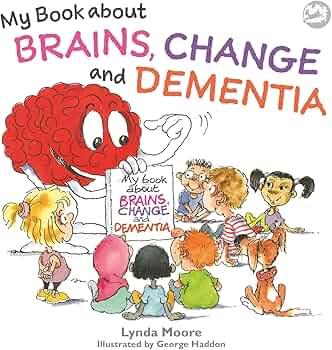
My Book About Brains, Change and Dementia: What Is Dementia and What Does It Do?
Selected for Reading Well for Dementia 2024: endorsed by health experts, charities and people affected by dementia.
‘Sometimes, a person’s brain gets sick with a disease called dementia.’
What does dementia do to the brain? What changes might we notice if a parent or grandparent has the disease? How might we feel about it and what can help?
This book breaks down misconceptions about dementia and speaks directly to children aged under 5 about the realities of the disease, using age appropriate language in an engaging and informative way. It reassures parents of the value of open and honest conversation about the challenges raised by dementia and offers advice and support in the opening ‘Guide for grown ups’. It includes a diverse audience of characters, to emphasize that ANY child can be impacted by dementia in their loved ones. Unlike traditional storybooks, the ending provides a question for the adult and child reading it to ponder together.









